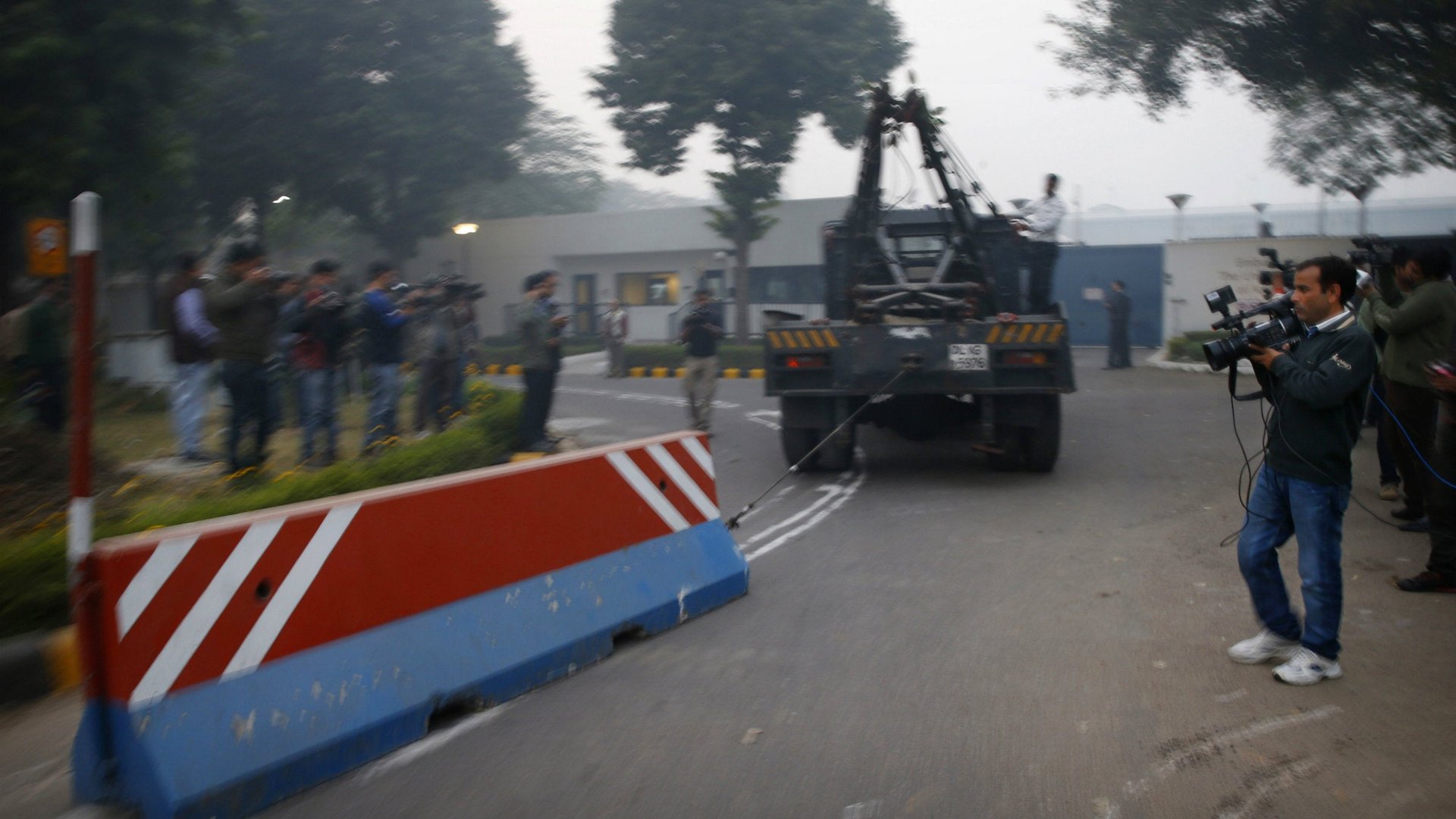Now that Devyani Khobragade is leaving the US, is this the end of US-India tensions?
Devyani Khobragade, the Indian consular employee at the center of the recent diplomatic upset between India and the United States, will leave the US after being indicted by a grand jury for visa fraud, a felony, on Jan. 9. But her case may leave a lasting stain on the relationship between the US and India, which has been sorely tested in the last few weeks. (Update: Khobragade reportedly flew home from the US early this morning. Hours later, India asked the US to send home a Delhi-based US diplomat who it claimed played an unstated role in Khobragade’s troubles in the US. The US has not responded publicly as yet to the apparent tit-for-tat expulsion.)


Devyani Khobragade, the Indian consular employee at the center of the recent diplomatic upset between India and the United States, will leave the US after being indicted by a grand jury for visa fraud, a felony, on Jan. 9. But her case may leave a lasting stain on the relationship between the US and India, which has been sorely tested in the last few weeks. (Update: Khobragade reportedly flew home from the US early this morning. Hours later, India asked the US to send home a Delhi-based US diplomat who it claimed played an unstated role in Khobragade’s troubles in the US. The US has not responded publicly as yet to the apparent tit-for-tat expulsion.)
Khobragade’s imminent departure allows her to avoid a trial, and if found guilty, a potential prison sentence of up to 15 years. It could make it difficult for her to return to the United States, though, where her husband is a citizen and her young daughters are in school. She was indicted on two charges of giving false statements to US immigration and state department authorities regarding the employment of her Indian housekeeper, Sangeeta Richard, but not on the more serious charge of human trafficking (which, given the historical precedents, seemed possible, as Quartz reported).
Notably, US officials said Khobragade was “very recently” granted diplomatic immunity, despite the earlier insistence by the US State Department that such a status could not be granted retroactively. The New York Times suggested ”that a separate understanding had been reached with other United States officials with the goal of relaxing tensions with India.”
There is a clear precedent for Khobragade being forced to leave because of the pending trial. Under US State Department guidelines (pdf, p.18), “in those instances in which a person with immunity is believed to have committed a serious offense (any felony or crime of violence) and the sending country has not acceded to the U.S. Department of State’s request for a waiver of immunity, it is the Department’s policy to require the departure of that individual from the United States.” What appears to be an olive branch (allowing her to leave the US) could be just the US State Department following protocol.
So what happens next?
Khobragade’s arrest sparked wide-spread protests in Delhi and has sparked a series of retaliatory actions against US officials in India, including the removal of the barricades around the US embassy in Delhi and, reportedly, a tax audit of US diplomats.
Even with her return to India, the strongly worded full indictment (pdf) offers a series of harsh allegations that could exacerbate diplomatic tensions. According to the grand jury, Khobragade agreed to terms of employment for Richard that she “knew violated US laws;” made a fake employment contract to be presented to the US Embassy, which resulted in Richard getting a visa; illegally underpaid and “exploited” Richard, giving her a wage that amounted to less than $1.50 an hour; and tried to strong arm her into signing a fake document in front of US immigration officials. She also lied to Indian authorities and courts, the US grand jury found.
One section, called “Khobragade’s evolving story” details how Khobragade may have actually helped to indict herself: in a filing to the High Court in India, she included a copy of the police report filed against Richard in India, which said that she would be “paid a monthly salary of 30,000 rupees,” providing evidence that she was severely underpaying the woman, according to US law.
Indian authorities have been calling for an apology from the US for Khobragade’s arrest, which the damning grand jury indictment makes clear is unlikely to happen. While US authorities may view not putting Khobragade on trial, and possibly in prison, as a win for India, Indian officials are unlikely to see it that way.
Khobragade herself remains unapologetic. In a statement, Khobragade’s attorney said she would leave New York this (Jan. 9) evening, was “pleased to be returning” to India and that she “knows she has done no wrong.”